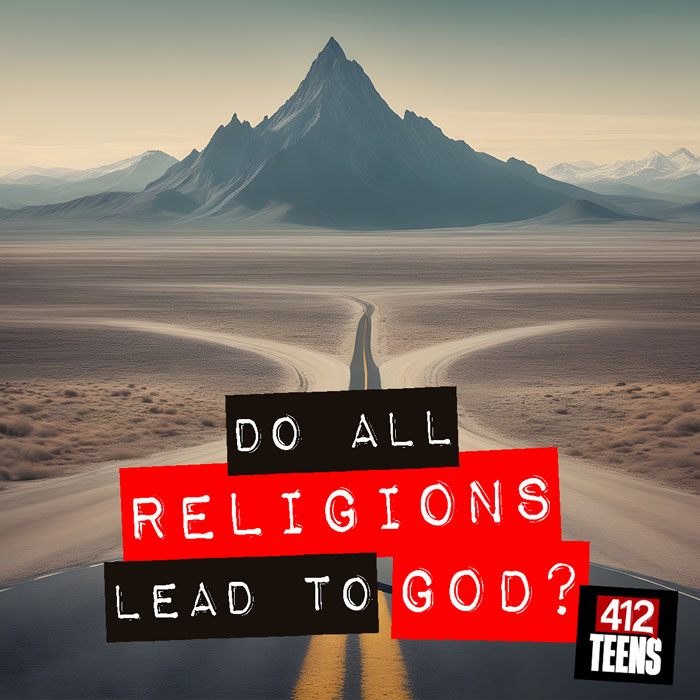Do all religions lead to the same God?

If you've ever been hiking in the woods, you're familiar with how various trails lead in different directions. Often, those trails will loop back to the same starting point or lead to the same lookout point. This is how some view one's spiritual journey toward God—different paths that all lead to the same destination.
While there are some similarities between world religions, there are also some major differences that do NOT lead to the same destination. Rather than allowing for a convergence between faiths, the varying religious beliefs of the world actually contradict each other, leading in separate directions.
Why are there so many religions?
Romans 1:19-21 gives us an explanation for why there are so many different religions across the world. The truth of God's existence is seen and known by all humans because God has designed us to recognize Him.
"[God's] invisible attributes, namely, his eternal power and divine nature, have been clearly perceived, ever since the creation of the world, in the things that have been made. So they are without excuse." —Romans 1:20
However, while the truth of God is obvious, many refuse to believe in a God who demands righteousness and morality. Due to our rebellious nature, human beings would rather deny God's truth than submit to it. Thus, many find themselves seeking their own path to finding meaning, purpose, and understanding.
Some Ways that Religions Contradict
One way that religions contradict each other is through their means of discovering God. Buddhism takes the approach of learning, Islam takes a pragmatic path of doing, and New Age religions focus on experience1. Christianity, on the other hand, focuses on discovering spiritual meaning and truth from God's Word. Meaning and truth are of far more importance to the human heart than head knowledge, doing good works, or having a spiritual experience.
Religions often contradict each other when it comes to creation, sin, heaven, hell, God's attributes, the source of spiritual truth, and salvation. So, while some religions might agree on overarching themes like love, goodness, or wisdom, their core tenets are very different.

For example, polytheistic religions teach that there are many gods that have control over different things like rain, fertility, or crops. Some believe that God lives inside His creation, while others believe that He is independent and outside of it.
Some believe that God is like a watchmaker who started the process then stood back, now uninvolved. Other religions hold to the teaching that God is still actively a part of our lives. Some only believe in the God of the Old Testament and do not acknowledge that Jesus is God or that God is triune. And some don't believe in a sentient spiritual power at all. Certainly, with all these contradictions, they can't all be worshipping the same God.
Major Differences
Probably the biggest point of contradiction for religions is concerning Jesus Christ. While most religions acknowledge the existence of Jesus, they do not agree on His ultimate purpose and identity. Jews, Muslims, Hindus, Buddhists, and others acknowledge that Jesus was a respected teacher and miracle worker, among other similarities2. But they do not believe that He was God incarnate, and, though they might acknowledge His death, most of those religions deny His bodily resurrection. They would disagree with His claim to be the only way to the Father (John 14:6) and salvation.
Another major difference between Christianity and other religions is that Christianity believes salvation is NOT result of what you DO but of what has been DONE by God (Ephesians 2:8-9). Most religions realize that the world is broken and imperfect. However, their solution is for mankind to try harder and for people's good works to outweigh their bad ones. In this way, a person can "earn" eternal rewards.
Christianity also recognizes humanity's brokenness, yet the Bible acknowledges that we could never accomplish enough "good" to earn God's forgiveness for our sin. Salvation is a gift from God, given through Jesus' death and resurrection, and received through one's faith in Jesus.
"Yet we know that a person is not justified by works of the law but through faith in Jesus Christ, so we also have believed in Christ Jesus, in order to be justified by faith in Christ and not by works of the law, because by works of the law no one will be justified." —Galatians 2:16
How do we know for sure that Jesus is the way?
"Jesus said to him, 'I am the way, and the truth, and the life. No one comes to the Father except through me.'" —John 14:6
Since Jesus is God, what He says is true—and anything opposite of the truth is false. Jesus didn't say that He was A way or just ONE way among many. Jesus said that He is THE way, which means that every other "path to God" is false. All roads do NOT lead to God; Jesus is the only way.
"There is salvation in no one else! God has given no other name under heaven by which we must be saved." —Acts 4:12
A Logical Look
If we want to look at this logically, then if Christianity is true, then all other religions must be false. That doesn't mean that no other religion can give people purpose or good morals. There's plenty of truth and goodness in other religions, which is where many of them agree.
The truth of Christianity means that our worldview is that no other religion will lead to God. While some details of other religions may agree with Christianity, their core beliefs are in error3.

Contradictory Paths Lead to Different Places
There are too many contradictions within the world's religions for them to all be pointing in the same direction. It would be like following trying to follow a road sign that points in all different directions; you would never get to your destination. All religions might be wrong, but they can't all be right. There's only one road that leads to God—only one.
So while we can be respectful of those we disagree with and acknowledge that everyone is on their own spiritual journey, we cannot agree that all religions worship the same God or lead to Him.
"Enter by the narrow gate. For the gate is wide and the way is easy that leads to destruction, and those who enter by it are many. For the gate is narrow and the way is hard that leads to life, and those who find it are few." —Matthew 7:13-14
The way we know that Christianity is the right path to God is because there is an extraordinary amount of logic, eyewitness accounts, scientific evidence, and historical archaeology to back up the truth of the Bible. Which path will you choose to follow?
REFERENCES: 1. "Are All Religions the Same?" GotQuestions.org, gotquestions.org/are-all-religions-the-same.html. Accessed 26 Sept. 2023. 2. "Who Is Jesus, according to Other Religions? | Cold Case Christianity." J. Warner Wallace. 2017, coldcasechristianity.com/writings/who-is-jesus-according-to-other-religions/. Accessed 26 Sept. 2023. 3. "I Don't Have Enough Faith to be an Atheist." Norman L. Geisler and Frank Turek. Crossway. 2004. Page 199.
ALSO SEE:
- What is the correct religion?
- What is a Christian worldview?
- Do faith in God and science contradict?
- Can we prove God's existence?
- What is the Bible?
- Is the Bible a fairy tale?
- Is the Bible a reliable record of the original writings?
- Who is Jesus?
- Is Jesus the only way to Heaven?
- What does it mean that Jesus is the way, the truth, and the life?
- Should Christians be tolerant?
- Why is Jesus the ultimate person of interest? (GotQuestions Podcast interview with J. Warner Wallace)
- Cold Case Christianity


TL;DR
While there are some similarities between world religions, there are also some major differences that do NOT lead to the same destination. Rather than allowing for a convergence between faiths, the varying religious beliefs of the world actually contradict each other, leading in separate directions. Some of the ways that religions contradict each other include their way of discovering God, their views on Jesus, and the way to salvation.
Since Jesus is God, what He says is true—and anything opposite of the truth is false. Jesus didn't say that He was A way or just ONE way among many. Jesus said that He is THE way, which means that every other "path to God" is false. All roads do NOT lead to God; Jesus is the only way (John 14:6; Acts 4:12).

Writer: Hanna S.
Hanna loves spending time with kids and teens. She enjoys being detectives with them to investigate God's Word to discover truths to answer any questions. She is the co-author of a newly published apologetics curriculum for children and teaches one online for highschoolers-adults. To learn more about her ministry you can visit networkerstec.com. For fun, she likes to play Ultimate Frisbee, read historical fiction, and paint.
